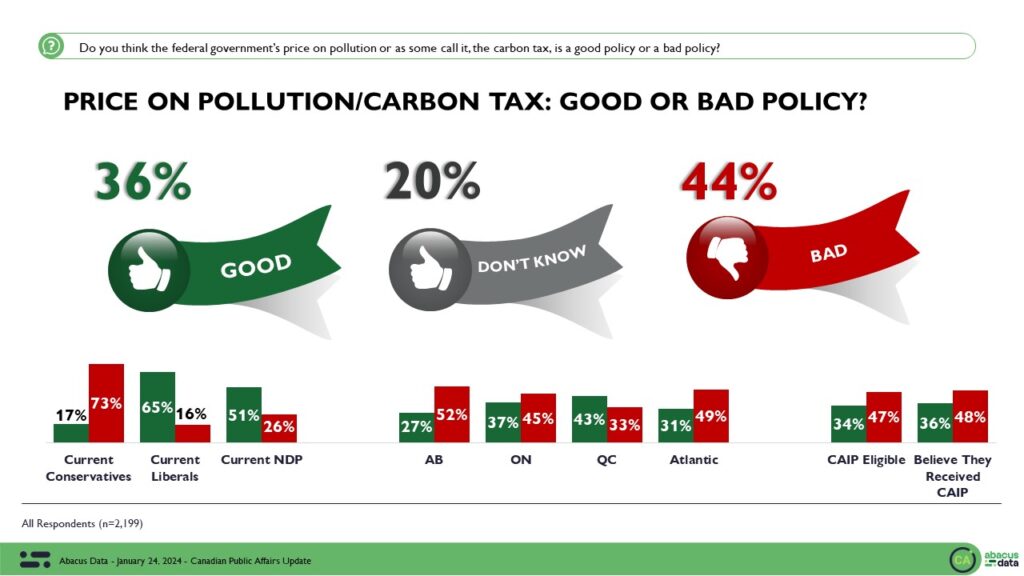
Public opinion on low-carbon policy is a crucial factor that federal and provincial governments must address. In a recent poll, most Canadians find that climate change is a serious threat, and that the government needs to enact more climate policies. 70% of Canadians polled supported the goal of reaching net-zero carbon emissions by 2030. However, the findings also show a 44% negative perception of the federal carbon tax (Discussed across article https://www.policymagazine.ca/climate-policy-and-public-perceptions-in-canada/). This section highlights key findings from public opinion studies, shedding light on Canadians’ perceptions of low-carbon policies and the resulting pressure on governments to take action.
70% of poll respondents support the claim that "the federal government should stop letting companies delay pollution reduction policies and actions” (Found in https://climateactionnetwork.ca/as-oil-and-gas-emissions-continue-to-rise-majority-of-canadians-want-stronger-regulation-and-quickly/).
Most respondents disagree that the government is currently doing enough to regulate and limit carbon emissions by oil and gas companies.
Majority support is reached across all provinces on the Canadian government pushing back against company delays in reducing their emission policies. However, the strength of the majority differs across provinces. In Alberta, where there is more dependence on oil and gas companies, only 55% of respondents support this claim, whereas Quebec, Ontario, and BC all have over 70% support.
Partisan affiliation plays a key role in public opinion as well. Liberal, NDP, and Bloc Quebecois supporters showed strong support for policies reducing oil and gas emissions.
The Pembina Institute finds that 83% of British Columbians supported the implementation of a government strategy to ensure energy needs are met in the future as the province transitions towards net-zero carbon emissions (Found in report PDF in https://www.pembina.org/pub/clean-resilient-future).
The overall public opinion perception of the carbon tax is that it is not providing enough. A study on public perception towards the carbon tax rebate in recent years shows a decline in support of 11 percentage points from 2021 to 2024 (Abacus Data research findings, cited here in https://ecofiscal.ca/reports/polling-results-perceptions-carbon-pricing-canada/).
A majority (54%) of respondents believed that they were not getting enough from their carbon tax rebates. According to the Canadian Climate Lobby, this perception and policy discrepancy highlights the need for stronger climate policy advocacy ( https://citizensclimatelobby.org/blog/policy/perception-gap-plagues-canadas-carbon-price/#).
Beyond this, key takeaways from the findings of Abacus Data’s study show that the government must take further action to strengthen their messaging strategies regarding their financially related climate policies. The findings reveal a key difference between the perceived impacts of the carbon tax compared to the actual policy. The report acknowledges that there is opposition towards the carbon tax within public opinion. This also could impact voting trends in future elections. About 1 in 4 former Liberal voters will depart from voting for the party as a result of the carbon tax, according to this study.
🔗 Read More: https://abacusdata.ca/carbon-tax-pollution-pricing-carbon-action-incentive-payment-abacus-data-polling/

(Above: Findings from an Abacus Data polling study, showing that 44% of respondents believed that policies implementing a price on pollution/the carbon tax is bad policy)
As highlighted in Provinces and CCUS , provincial governments' carbon capture strategies have elicited mixed reactions from the public. While CCUS can aid in the short-term decarbonization of highly polluting industries like oil and gas, it also enables these sectors to continue emitting heavily. Environmental concerns further fuel skepticism, with critics arguing that CCUS is not a viable long-term solution for reducing Canada’s emissions.
Pembina’s report calls for a deeper examination of CCUS feasibility, suggesting that electrification may be a more effective alternative to Liquefied Natural Gas (LNG), a sector that relies heavily on carbon capture technologies
Previous: Expert Judgements
Next: Government Regulators